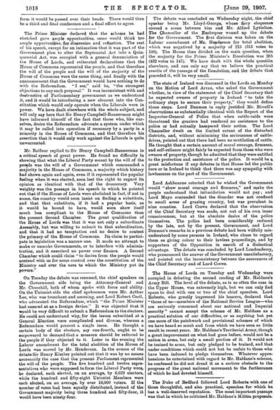On Tuesday the debate was resumed, the chief speakers on
the Government side being the Attorney-General and Mr. Churchill, both of whom spoke with force and ability. On the Unionist side the chief spokesmen were Mr. Arthur Lee, who was trenchant and amusing, and Lord Robert Cecil, who advocated the Referendum, which "the Prime Minister had seemed at as a foreign device." It was objected that it weuld be very difficult to submit a Referendum to the electors. Re could not understand why, for the halloo submitted at a General Rlection were complicated and diverse, whereas a Referendum would present a single issue. He thought a certain body of the electors, say one-fourth, ought to be empowered to demand that a measure should be referred to the people if they objected to it. Later in the evening the Labour amendment for the total abolition of the House of Lards was moved by Mr. Henderson. in the course of the debate Sir Henry Kimber pointed out that it was by no means necessarily the case that the present Parliament represented the will of the people. The five hundred and twelve repre- eentativee who were supposed to form the Liberal Party were, he declared, each elected, on an overage, by 6,629 electors, while the hundred and fifty-eight Unionist Members were each oleos& on an average, by ever 16,000 voters. 11 the number of votes bad been equally distributed, instead of the Government nuijority being three hundred and fifty-four, it would have been ninety-four. The debate was concluded on Wednesday night, the chief speaker being Mr. Lloyd-George, whope fiery eloquence caused a scene between him and Mr. Alfred Lyttelton. Ti's Cffiancellor of the tchequer wound up the debate for the Government. The first division was taken on the Labour amendment of Mr, Henderson for total abolition, which was negatived by a majority of 215 (315 votes to 100). The House then divided on the main question, when the majority for the Prime Minister's Resolution was 285 (432 vote e to 147): We have dealt with the whole question elsewhere, and can only say that we believe the practical results of the passage of the Resolution, and the debate that preceded it, will be very small.
















































 Previous page
Previous page